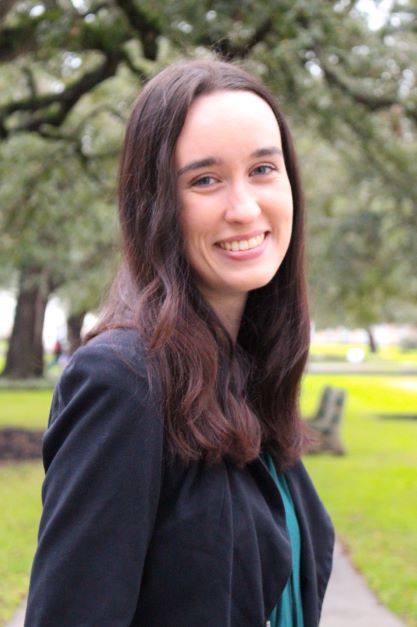Keeping up with Altmans: Karlyn Simcox Interns with Tulane Title IX

Content warning: this article discusses sexual violence and its effects in student organizations.
Karlyn Simcox of the 2023 cohort spent the summer as an intern at the Title IX Office here at Tulane. She drew upon her past experiences and research to create a guide for student organizations on how to prevent and respond to sexual violence. She told us more about her internship:
"One of the first things that drew me to Altman was its prioritization of interdisciplinary learning. My internship with the Tulane Title IX Office this past summer is a prime example of this focus. My interest in this subject area is a culmination of the courses and communities I’ve been exposed to in Altman and the passion for change these studies gave me. As a political science major, I believe a cornerstone of my studies is deepening my understanding of the impacts of different power-based systems around the world. Sexual violence is power-based violence, so all of the other anti-oppressive frameworks I’ve gotten to discuss in the classroom feed into my work on campus. I grew up in a community where abstinence-only education was the norm, and very few truly survivor-centric resources were available. I never had the opportunity to be involved with trauma-informed care before coming to Tulane, so I am thankful to Altman for the support to pursue passions that oftentimes intersect with one of its stated learning outcomes: 'the ability to communicate and collaborate across lines of difference.'
"I am also thankful to the other communities I’ve found on campus and around the world that support my work. I got my start in this issue as a freshman representative to what was formerly the Undergraduate Student Government Sexual Violence Prevention and Response committee (SVPR). The organization has since transitioned to the Newcomb Institute, and I serve as its Director of Response. My journey in learning what truly constitutes survivor-centric frameworks also led me to Sexual Aggression Peer Hotline and Education (SAPHE), where I am one of many operators of a 24/7 sexual violence hotline for the Tulane community. As a paid SAPHE, I am also in the process of constructing a timeline of sexual violence in the United States to be displayed physically and virtually this April for Sexual Assault Awareness Month. All of these professional experiences and my own identity as a queer person led me to an internship with Federación Argentina LGBT (FALGBT) during my time abroad in Buenos Aires, Argentina. There, I analyzed Spanish records of incidents of power-based violence occurring to queer individuals in Argentina and around the world.
"All of these experiences gave me a strong knowledge of where survivors, especially those on Tulane’s campus, needed stronger support. This specialized knowledge led me to become the Title IX student organizations intern. In this role, I created a guide for student organization leaders to address sexual violence occurring to or between their members. Because student organizations are often rife with power structures and 75% of Tulane students who have experienced sexual violence said they knew the perpetrator beforehand, it is imperative that student organization leaders combat the unique factors contributing to sexual violence in their organizations. I was already passionate about this issue as it was one I began work on through SVPR and facilitated workshops for through SAPHE, so I am thankful that Title IX gave me a platform to affect the change I wanted to on an institutional level.
"I was very intentional in crafting the resource to best serve student organizations while keeping survivors at the center of their work. I first outlined the relevant offices on campus and how students can access them at different levels of anonymity. I then broke the rest of the guide into two main sections: prevention and response. The prevention section is focused on how a student organization can prepare itself before an incident occurs by making leadership and accountability policies clear in their constitution and their everyday values. The response section tackles how student leaders should respond if a survivor discloses to them, remedies that are available through the university and the community, and how the student organization can be involved in the response in a survivor-centric way. Each of these subject areas are followed by example strategies that student leaders can implement and key terms so that the material is accessible.
"Now that the guide is finished, I am continuing to work with the Office and other faculty to coordinate an annual meeting where this resource is presented to student organizations. I would not have been able to perform in this role at the level I did without the leadership qualities, organizational skills, and international and interdisciplinary perspectives I gained as a result of being an Altman Scholar. I also would not have been in the midst of law school applications as I am now without Altman’s encouragement to transform this passion of mine into a career. It is my greatest hope that any current or prospective Altman who is reading this article and considering venturing outside of the program’s traditional fields gives it a shot. As I’ve learned through this internship, the skills Altman cultivates are not only applicable to liberal arts and business but instead to being a citizen of the world and for its people. I look forward to embodying these values for the rest of my life, and I cannot wait to see where the tools Altman has given me take me next."
Karlyn is a recipient of the Altman Program Summer Internship Award.
